Tesla Model S: DCDC Converter - 2nd Generation (Remove and Replace)
Warning: Only technicians who have been trained in High Voltage Awareness are permitted to perform this procedure. Proper personal protective equipment (PPE) and insulating HV gloves with a minimum rating of class 00 (500V) must be worn any time a high voltage cable is handled. Refer to Tech Note TN-15-92-003, "High Voltage Awareness Care Points" for additional safety information.
This procedure only applies to vehicles with the 2nd generation High Voltage configuration. For vehicles with the 1st generation High Voltage configuration, refer to DCDC Converter (Remove and Install).
Removal
- Perform the vehicle electrical isolation procedure (refer to procedure).
- Remove the battery coolant heater (refer to procedure).
Caution: Do not allow coolant to spill onto the High Voltage Battery, forward junction Box, DCDC Converter, battery coolant heater, or any harnesses.
Note: After removing the heater, it might be helpful to plug the upper coolant hose on the DCDC converter and remove the clamp. This provides additional clearance in the working area to remove the DCDC converter.
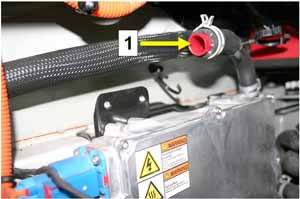
| 1 | Plugged coolant hose |
- Cut the zip tie that holds the top coolant hose to the firewall. Move the coolant hose out of the way.
- Release the 2 bolts that secure the bracket on the top of the
DCDC converter to the firewall (torque 22 Nm).
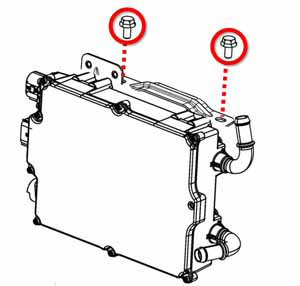
- Release the nut that secures the bracket on the lower LH side of
the DCDC converter (torque 22 Nm).
Caution: This nut is very difficult to retrieve if dropped. It might be helpful to use a magnet to hold the nut while it is being removed.
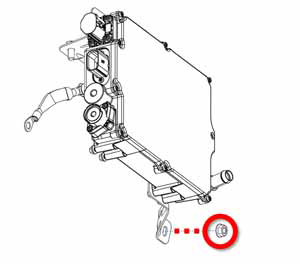
- Release the 2 harnesses on the RH side of the DCDC converter.
.png)
- Release the ground bolt (torque 25 Nm).
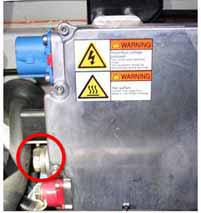
- Release the 12V positive bolt (torque 13 Nm).
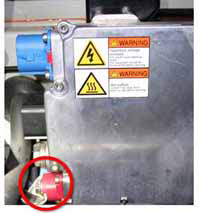
- Release the fastener that secures the ground strap to the body (torque 9 Nm).
- Remove the cable tie that secures the coolant hose to the lower
crossmember.
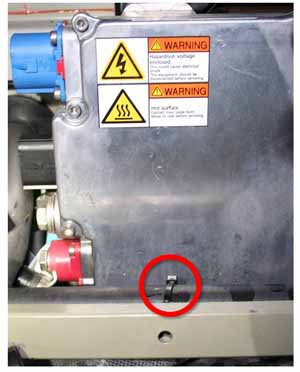
- Place absorbent material in the base of the frunk to catch any coolant that is spilled in the next steps.
- Place a container in the frunk to catch coolant.
- Gently pull the DCDC into the frunk area, but do not fully
remove it.
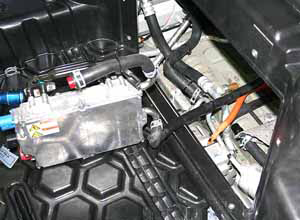
- Clamp the coolant hose close to the DCDC converter.
- Release the locking clamp that secures the coolant hose to the DCDC converter. Drain the coolant from the DCDC converter and from the hose into the container.
Installation procedure is the reverse of removal, except for the following:
Refill and bleed the cooling system (refer to procedure).

